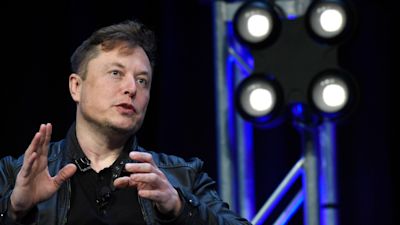What changes does Elon Musk want to make to Twitter and what does he mean by 'free speech'?

Elon Musk, the world's richest person, has struck a deal to buy Twitter for around $44 billion (£34.6 billion).
At the heart of his plans appears to be a promise for a more lenient approach to policing content on the platform where he promotes his interests, attacks critics and opines on a wide range of issues to more than 83 million followers.
There are fears over what the outspoken Tesla CEO will actually do with the platform, particularly at a time when online abuse and hate speech are rife.
It remains to be seen what changes will be made by Mr Musk and there is, as yet, little detail revealing his vision - but there have been suggestions and vague ideas.
Here's a look at what the billionaire could have in store for Twitter.
What does Elon Musk mean about free speech?
Mr Musk describes himself as a "free-speech absolutist," although he hasn't been exactly clear what he means by that.
He acknowledged that Twitter would have to abide by national laws governing speech in markets around the world.
Listen to the ITV News What You Need To Know podcast
Mr Musk himself, though, regularly blocks social media users who have criticised him or his company and has used the platform to go after reporters who have written critical articles about him or his company.
Some users said on Monday that they were planning to quit the platform if he took it over.
He responded on Twitter: “I hope that even my worst critics remain on Twitter, because that is what free speech means.”
Will we have to pay to use Twitter?
Mr Musk has in recent weeks suggested, among other things, shifting away from its advertising-based revenue model.
He believes he can increase revenue through subscriptions that give paying customers a better experience, perhaps even an ad-free version of Twitter.
Hasn’t Elon Musk had trouble with Twitter before?
Mr Musk has previously run into problems with US regulators at the Securities and Exchange Commission (SEC) over his own tweets, having been accused of breaching trading rules when tweeting about his business interests.
The SEC has been investigating Mr Musk’s August 2018 tweets in which he asserted that he’d secured funding to take Tesla private for $420 a share, though he had not.
He has also been accused of tweeting misinformation about Covid-19 after posting in March 2020 that children were “essentially immune” to the disease.
Could Donald Trump come back?
Mr Musk’s attitude to free speech is shared by the likes of Donald Trump and a number of other right-wing political figures who have had their accounts suspended for violating Twitter content rules but claim they have been the victims of censorship.
Some believe a Musk takeover could mean a return to the platform for Mr Trump and others, but reinstating those users would be a highly controversial move and could bring further scrutiny to the company and its approach to moderation, just as major new regulation for the sector is on the horizon.
However, the former US president said on Monday that he has no intention of rejoining Twitter even if his account were to be reinstated.
Mr Trump told Fox News that he will instead focus on his own platform, Truth Social, which has been mired in problems since its launch earlier this year.
“I am not going on Twitter. I am going to stay on Truth,” Mr Trump was quoted telling the network.
“I hope Elon buys Twitter because he’ll make improvements to it and he is a good man, but I am going to be staying on Truth.”
Mr Trump was barred from major social media platforms after the deadly January 6 insurrection, with Twitter citing the “risk of further incitement of violence."
The decision denied him the megaphone he had used to generate media attention and speak directly to his followers, which had been integral to his political rise.
Will users be able to edit their tweets?
In a series of deleted tweets, Mr Musk made several suggestions about how to change Twitter, including adding an edit button for tweets and granting automatic verification marks – or ‘blue ticks’ – to premium users.
Studies of bot-generated activity on Twitter have concluded that nearly half of accounts tweeting about Covid-19 are likely bots.
It’s therefore feared that allowing users – whether they are automated bots or actual people – the option to edit their tweets could become another weapon in the disinformation arsenal.
Editing tweets could allow users to selectively distort what they said, or deny making inflammatory remarks, which could complicate efforts to trace misinformation.